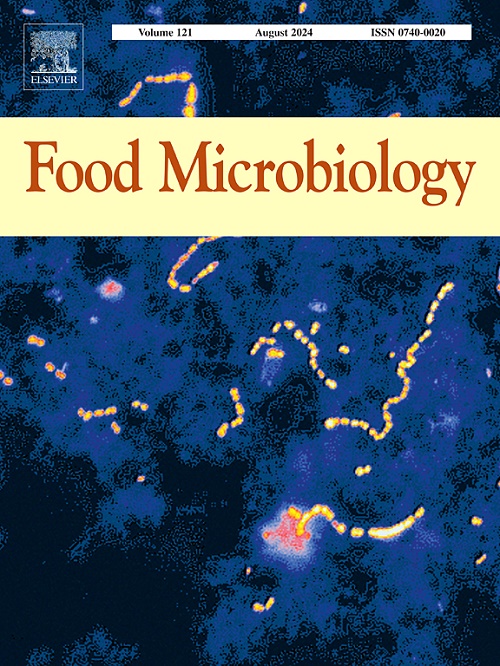Interaction between a Lactococcus lactis autochthonous starter and a raw goat milk microbial community during long-term backslopping
IF 4.5
1区 农林科学
Q1 BIOTECHNOLOGY & APPLIED MICROBIOLOGY
引用次数: 0
Abstract
Traditional cheesemaking processes often involve backslopping practice. However, over successive inoculations, acidification deficiencies may arise. In such cases, adding a starter is recommended to restore the ecosystem stability. This study examines the impact of an autochthonous starter composed of three Lactococcus lactis strains on a raw goat milk microbial community during their evolution. Bacterial composition and technological features (acidification and aroma) were analyzed during communities’ evolution over 800 generations. 16S rRNA gene metabarcoding showed that Lactococcus lactis strains predominated. The raw goat milk community acidification capacities varied early in the evolution and then remained stable. Adding the L. lactis starter to this community stabilized the ecosystem from the beginning of the evolution. The acetoin production was associated with the starter presence, consistent with the establishment of the diacetylatis biovar strain from the starter in the raw goat milk community throughout the evolution. Increased or decreased production of some volatile organic compounds when the starter was added revealed a specific aroma footprint due to interactions between the two communities. This study showed that adding a starter could help to achieve the maximum acidification rate from the early inoculation cycles and could significantly modify the aroma profile during long-term backslopping.
自生乳球菌发酵剂与生羊奶微生物群落在长期回流过程中的相互作用
传统的奶酪制作工艺通常采用反冲法。然而,在连续接种的过程中,可能会出现酸化不足的情况。在这种情况下,建议添加起发酵剂来恢复生态系统的稳定性。本研究探讨了由三种乳酸乳球菌菌株组成的自产启动剂在进化过程中对生山羊奶微生物群落的影响。研究分析了 800 多代群落演化过程中的细菌组成和技术特征(酸化和香味)。16S rRNA 基因代谢编码显示,乳酸乳球菌菌株占主导地位。生山羊奶群落的酸化能力在进化初期有所变化,随后保持稳定。在这一群落中加入乳酸乳球菌起始菌,从进化开始就稳定了生态系统。乙炔醛的产生与起始菌的存在有关,这与起始菌在整个进化过程中在生羊奶群落中建立双乙酰菌生物菌株是一致的。加入开胃剂后,一些挥发性有机化合物的产量增加或减少,显示了由于两个群落之间的相互作用而产生的特定香味足迹。这项研究表明,添加开胃剂有助于实现早期接种周期的最大酸化率,并能显著改变长期回流过程中的香气特征。
本文章由计算机程序翻译,如有差异,请以英文原文为准。
求助全文
约1分钟内获得全文
求助全文
来源期刊

Food microbiology
工程技术-生物工程与应用微生物
CiteScore
11.30
自引率
3.80%
发文量
179
审稿时长
44 days
期刊介绍:
Food Microbiology publishes original research articles, short communications, review papers, letters, news items and book reviews dealing with all aspects of the microbiology of foods. The editors aim to publish manuscripts of the highest quality which are both relevant and applicable to the broad field covered by the journal. Studies must be novel, have a clear connection to food microbiology, and be of general interest to the international community of food microbiologists. The editors make every effort to ensure rapid and fair reviews, resulting in timely publication of accepted manuscripts.
 求助内容:
求助内容: 应助结果提醒方式:
应助结果提醒方式:


